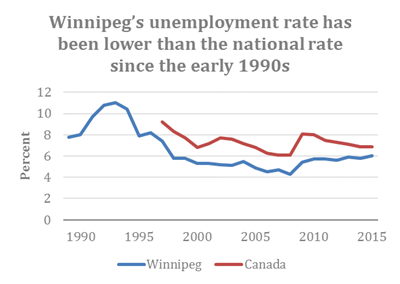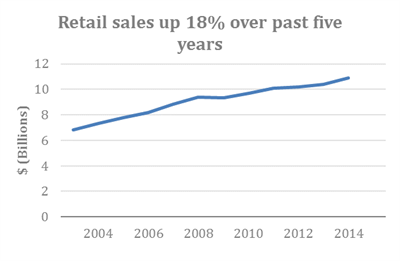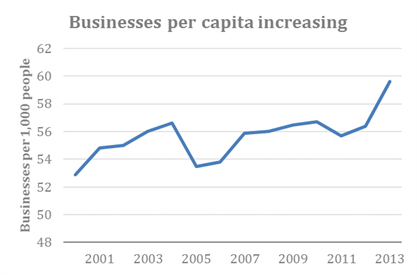A closer look at three aspects of Winnipeg’s economy
We took a look at three indicators in Peg’s Economy theme to see how Winnipeg is doing: Unemployment, Retail Sales, and Businesses Per Capita.
On Thursday, Mayor Bowman gives his second State of the City Address. We took a look at three indicators in Peg’s Economy theme to see how Winnipeg is doing: Unemployment, Retail Sales, and Businesses Per Capita.
Peg tells us…
Unemployment Rate
Winnipeg’s unemployment rate has been lower than the national rate since the early 1990s.
The unemployment rate shows the percentage of Canadian adults (15 years of age and over) who are not working for pay, and are therefore not in a position to earn income. It is a common measure of economic well-being, and is one of the major social determinants of health.
More facts available at:

Retail Sales
Over a five-year period, annual retail sales in Winnipeg increased 18% from $9.2 billion in 2009 to $10.9 billion in 2014.
Retail sales figures track the dollar value of merchandise sold within the retail trade, and reflect consumer spending and confidence.
More facts available at: http://www.mypeg.ca/explorer/WellBeing/Economy/RetailSales/

Businesses Per Capita
The number of businesses per capita is at its highest level since 2000, increasing from 52.9 businesses per 1,000 Winnipeggers in 2000 to 59.6 in 2013.
In Canada, 70% of the total private sector labour force is employed by small businesses. Their contribution to economic development is made in several ways: converting innovative ideas into economic opportunities, revitalizing social and productive networks, and increasing productivity.
More facts available at: http://www.mypeg.ca/explorer/WellBeing/Economy/Businesses/

Source of the data:
Peg’s data for the Unemployment Rate indicator provided by Statistics Canada. Data for Businesses per Canada and Retail Sales provided by Economic Development Winnipeg.
Media inquiries:
For interviews on Peg, the data, or to be connected with organizations making a difference in the community, please contact:
Sumeep Bath, Media and Communications Officer
International Institute for Sustainable Development (IISD)
(204) 958-7740 | sbath@iisd.ca
About us:
Peg (mypeg.ca) is a community indicator system that measures the health of our community year over year – in ways that count. Peg is led by two partnering organizations – the International Institute of Sustainable Development (IISD) and United Way of Winnipeg (UW).
Regularly, the team at Peg releases data and facts that help us understand our city better. This is one of those regular reports. Others can be found at http://www.mypeg.ca/blog.
Peg is the starting place for Winnipeg citizens, educators, policy makers, and many others to learn more about our city so we can lead change to create a better city for our children and their children. At Peg we can all learn how our lives, our neighbourhood and our city is changing – for the good and the bad. Learn more at www.mypeg.ca.
About IISD
The International Institute for Sustainable Development (IISD) is an award-winning independent think tank working to accelerate solutions for a stable climate, sustainable resource management, and fair economies. Our work inspires better decisions and sparks meaningful action to help people and the planet thrive. We shine a light on what can be achieved when governments, businesses, non-profits, and communities come together. IISD’s staff of more than 250 experts come from across the globe and from many disciplines. With offices in Winnipeg, Geneva, Ottawa, and Toronto, our work affects lives in nearly 100 countries.
You might also be interested in
Human Capital in Ethiopia, Indonesia, and Trinidad and Tobago
Human capital is the major component of comprehensive wealth in most countries, and how it is managed is key to long-term prosperity.
Financial Capital in Ethiopia, Indonesia, and Trinidad and Tobago
Like other assets of the comprehensive wealth portfolio, financial capital can be used to support a country's long-term prosperity.
Natural Capital in Ethiopia, Indonesia, and Trinidad and Tobago
Natural resources play fundamental roles in our well-being and lives, as well as sustaining a country's comprehensive wealth.
Produced Capital in Ethiopia, Indonesia, and Trinidad and Tobago
Part of comprehensive wealth, produced capital is the value of the stock of all human-made assets used to produce goods and services in the economy.